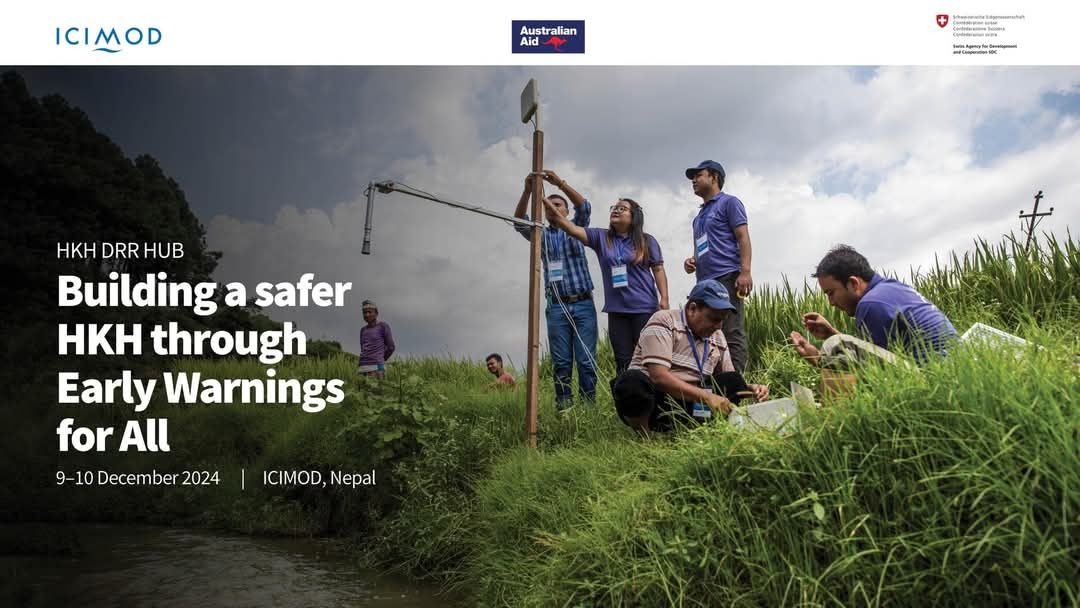Kathmandu, 11 December 2024 – Senior Disaster Management experts from Bangladesh, Bhutan, China, India, Nepal, and Pakistan gathered in Kathmandu to endorse a groundbreaking initiative aimed at mitigating the escalating impacts of climate-induced disasters in the Hindu Kush Himalaya (HKH) region. The meeting marked the launch of the Hindu Kush Himalaya Disaster Risk Reduction (DRR) Hub, a collaborative platform designed to foster knowledge sharing, policy alignment, and coordinated action against mountain hazards. This region faces disproportionately severe risks from climate-induced disasters due to its complex topography, extreme weather conditions, and high population density.
The meeting marked the launch of the Hindu Kush Himalaya Disaster Risk Reduction (DRR) Hub, a collaborative platform designed to foster knowledge sharing, policy alignment, and coordinated action against mountain hazards. This region faces disproportionately severe risks from climate-induced disasters due to its complex topography, extreme weather conditions, and high population density.
Saving Lives and Livelihoods
“This initiative is about saving lives, safeguarding livelihoods, and protecting economies in a region where rising temperatures are exacerbating hydrological changes, destabilizing ground conditions, and intensifying river systems,” stated Pema Gyamtsho, Director General of the International Centre for Integrated Mountain Development (ICIMOD).
Neera Shrestha Pradhan, ICIMOD’s expert in Managing Cryosphere and Water Risks, emphasized the urgency of collaboration, stating, “We are running out of time to prepare for the destructive events that climate change will continue to unleash. Regional partnerships are essential to mitigate the impact on families, infrastructure, and ecosystems.”
Mounting Disasters in the Region
In 2024 alone, floods in Pakistan were labeled the “most deadly climate event of the year,” while severe rainfall in Bangladesh displaced 18 million people. Nepal faced unprecedented rainfall that claimed 268 lives and devastated homes, agricultural land, and infrastructure.
“Pooling resources and expertise is crucial, especially in a region where governments are stretched to deliver even basic services,” said Kavitha Kasyanathan, Head of Development at the Embassy of Australia to Nepal.
Global and Regional Cooperation
Key stakeholders, including representatives from UN agencies, NGOs, and regional governments, participated in the event. The launch of the DRR Hub aligns with the United Nations’ Early Warnings for All (EW4All) initiative, which aims to provide universal early warning coverage by 2027.
“The EW4All initiative emphasizes disaster risk management, monitoring, and preparedness,” highlighted Diana Patricia Mosquera Calle from the United Nations Office for Disaster Risk Reduction (UNDRR).
Towards Multi-Hazard Preparedness
Sanjay Srivastava of UNESCAP called for a shift from single-hazard early warnings to multi-hazard systems that consider cascading risks, such as dam collapses during floods. “Anticipatory actions must address interconnected risks to build resilient communities,” he noted.
A Decade of DRR Leadership
ICIMOD, with over a decade of expertise in community-based early warning systems, has been recognized globally for its efforts, including winning the UNFCCC Lighthouse Award in 2014. This innovative approach has also been successfully scaled to regions beyond the HKH, including Africa.
This two-day event, supported by the Australian Embassy in Nepal and the Swiss Development Cooperation, underscores the critical importance of collective action to safeguard the HKH region from the intensifying impacts of climate change.
Stay informed on disaster resilience efforts at ecospherenews.com.